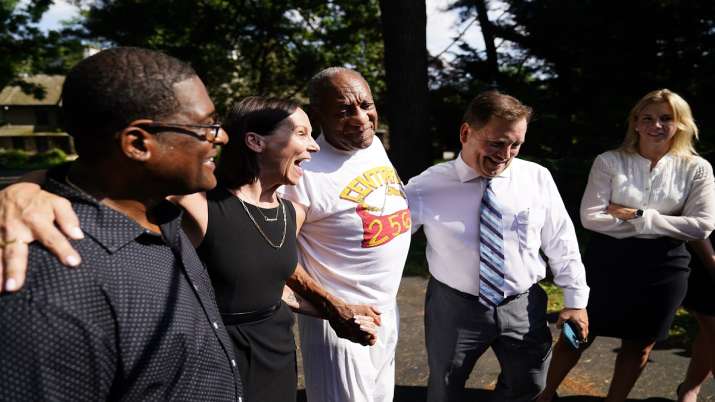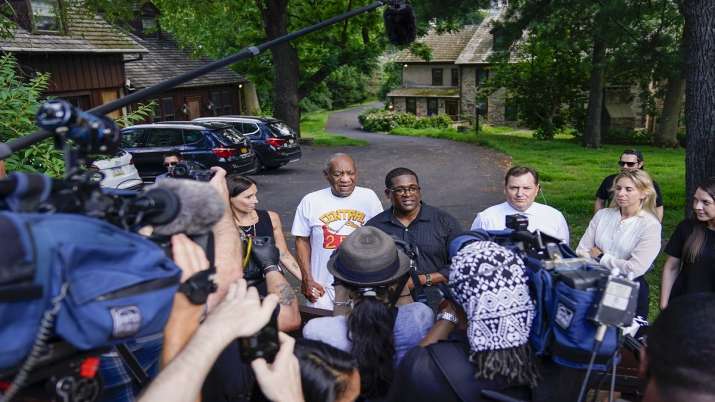
Bill Cosby, center, listens to members of his team, speaks with members of the media outside Cosby’s home in Elkins Park, Pa., Wednesday, June 30, 2021, after the Supreme Court of Pennsylvania sentenced his sexual assault overturned.
Bill Cosby’s sexual assault conviction was overturned on Wednesday by Pennsylvania’s Supreme Court in a ruling that freed the actor from more than three years in prison after he was found to be a Temple University employee at his suburban Philadelphia mansion. Andrea Constand was found guilty of drug and molestation.
Cosby, 83, was the first celebrity tried and convicted in the #MeToo era, and her conviction was seen as a turning point in the movement to hold powerful men accountable for sexual misconduct.
Here’s a look at the case against Cosby and the court’s decision:
Why did the court turn down his sentence?
The Split Court found that Cosby was unfairly prosecuted after the previous district attorney had promised the comedian, once known as “America’s Dad,” that he would not be indicted on Constand’s charges. Cosby was charged by another prosecutor who claimed he was not bound by that settlement.
The court said that it is not so. The judges found that Cosby relied on that promise when he agreed to testify without invoking his Fifth Amendment charge against self-incrimination in a trial brought against him by Constand.
The court concluded that the prosecutors who later brought the charges were bound to stick to the non-prosecution agreement, so the conviction could not be held. The judges wrote that “depriving the defendant of the benefit of that decision is an insult to fundamental fairness, especially when it results in a criminal prosecution that was abandoned for more than a decade.”
Bill Cosby, center, and spokesman Andrew Wyatt, media right, liaison members gather outside the entertainer’s home in Elkins Park, Pa., Wednesday, June 30, 2021.
What’s the Deal with the Non-Prosecution Agreement?
A promise not to prosecute Cosby was made in 2005 by Bruce Castor, then the top prosecutor for Montgomery County. Castor was also on the legal team that defended former President Donald Trump during his historic second impeachment trial by his supporters over the January 6 uprising at the US Capitol.
During a court hearing weeks after Cosby’s 2015 arrest, Castor testified that he had promised Cosby that he would not be prosecuted, in the hope that it would allow the actor to testify in a civil case brought by Constand. and allow him to win damages. Castor acknowledged that the only place to put the case in writing was to announce his decision to prosecute in a 2005 press release, but said his decision was to protect Cosby from prosecution “for all time.”
His successor noted during the appeals arguments that Castor said in the press release that he may reconsider the decision in the future.
Castor had said that it would be difficult to prove Constand’s case in court because she waited a year to come forward and kept in touch with Cosby.
The first jurors to hear the case probably agreed with him, as they could not reach a verdict in 2017. But a second jury paneled after the explosion of the #MeToo movement found him guilty in the 2018 trial. Constand settled his civil case against Cosby for more than $3 million.
Castor’s successor, District Attorney Kevin Steele, charged Cosby in 2015 after a federal judge, acting on a request from the Associated Press, unsealed documents from his 2005 trial against Cosby, along with Constand and others. disclosed her damaging testimony about sexual encounters. Castor has said that Cosby “would have gone mad for saying those things if there was any chance he could be prosecuted.”
How rare is this?
Extremely rare.
Wesley Oliver, a Pennsylvania law professor who has followed Cosby’s case closely over the years, said he’s never heard of a high court in Pennsylvania or anywhere else prosecuted with an informal promise not to prosecute him.
“It breaks completely new ground,” said Oliver, who teaches at Duquesne University School of Law in Pittsburgh. “It sets a precedent for not only Pennsylvania but probably other states.”
He said the ruling should risk prosecutors suggesting privately at news conferences, in press releases or verbally that they would not prosecute.
“They should add at least three words – ‘at this time,'” he said. “If you add that qualifier, which was not done in Cosby’s case, you should be good to go,” Oliver said.
Can Cosby be tried again?
It is highly unlikely. Wednesday’s ruling barred Cosby from trying again on Constand’s complaint, calling it “the only remedy that is consistent with the reasonable expectations of society’s own elected prosecutors and our criminal justice system.”
And the charges leveled by dozens of other women, including five who testified at his 2018 trial, often go back decades and are most likely to stand trial.
Cosby turns 84 the following month. However, his lawyer said that he is in good health, except for vision problems that make him legally blind.
The trial judge considered him a sexually violent predator who could still pose a threat to women given his wealth, power, and fame, and ordered that he remain on the sex offender registry for life and conduct monthly checks with officers. However, the decision negates that finding.
Read also: Shibani Dandekar Reacts to Britney Spears, Bill Cosby Case Verdict, Says ‘Stop Controlling Women’
.
